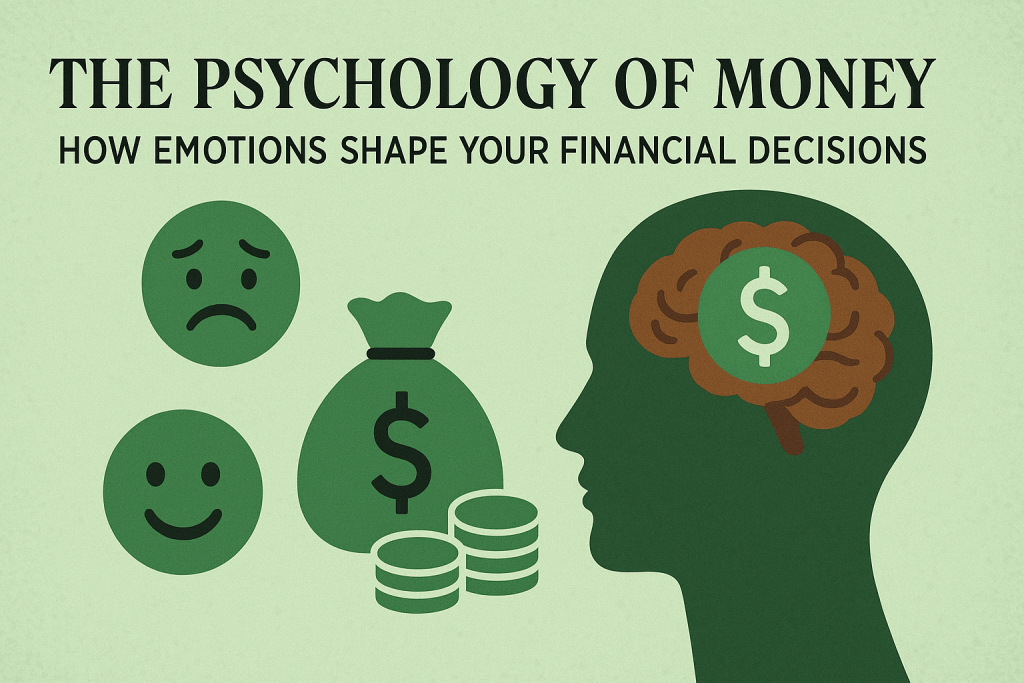Most financial advice focuses on numbers: how much to save, where to invest, and how to budget. But even the best strategy can fall apart if we don’t understand the emotional drivers behind our financial choices.
Money isn’t just logical—it’s deeply emotional. Our decisions are influenced by past experiences, fears, desires, and habits formed over decades. Whether it’s the thrill of a spontaneous purchase or the anxiety of checking your bank account, our money mindset plays a huge role in shaping our financial health.
In this post, we explore how emotions impact financial behavior and how building awareness of your “money psychology” can lead to more mindful, confident decision-making.
1. Where Money Emotions Come From
Everyone has a unique emotional relationship with money. Often, it’s rooted in childhood. Did your family talk about money openly, or was it a taboo subject? Were you raised with scarcity, abundance, or financial uncertainty?
These early impressions form what behavioral scientists call “money scripts”—unconscious beliefs that influence how we earn, spend, save, and give. Common examples include:
- “I don’t deserve wealth.”
- “Money equals freedom.”
- “There will never be enough.”
- “Spending makes me feel better.”
Identifying your money script is the first step to reshaping unhelpful patterns.
2. Emotional Spending: A Common Trap
Have you ever made a big purchase to celebrate, cope with stress, or reward yourself after a tough day? That’s emotional spending, and it’s more common than we think.
Some triggers include:
- Stress or anxiety
- Boredom or loneliness
- Social pressure or comparison
- Big life transitions
Emotional spending often provides short-term relief—but long-term regret. It can create cycles of guilt and debt that are hard to break without deeper awareness.
A helpful strategy is to pause and ask: What am I feeling right now, and what do I really need? Often, it’s not the product—it’s comfort, control, or validation.
3. The Stress Factor: How Anxiety Skews Choices
When we’re under financial stress, we often make short-term decisions that go against our long-term goals. This is a survival mechanism. Our brains are wired to focus on immediate safety—not future returns—when we’re in crisis mode.
Examples of stress-driven choices:
- Cashing out retirement savings early
- Avoiding bank statements altogether
- Relying on high-interest credit for essentials
Understanding that these responses are normal—but not always helpful—can reduce shame and open the door to better support and planning.
If you find yourself overwhelmed, having access to tools like a Money Market Deposit Calculator (available at Smart Financial Lifestyle) can help you visualize your savings goals and make calmer, more informed decisions.
4. Building a Mindful Money Mindset
So how can we shift from reactive to intentional financial behavior? It starts with mindfulness—paying attention to your thoughts, emotions, and habits without judgment.
Try these techniques:
- Track your emotions when spending or saving
- Journal your thoughts around money challenges
- Identify patterns in when and why you overspend
- Set non-monetary goals alongside financial ones (like peace of mind or security)
Mindfulness builds the self-awareness needed to pause before reacting—and make values-based choices instead.
5. Money Talks and Emotional Safety
Money is one of the leading sources of tension in relationships. That’s often because people approach money with very different emotional histories. One partner might associate money with security; the other, with control or stress.
Creating emotional safety in financial conversations means:
- Listening without blame
- Asking about each other’s money stories
- Respecting different comfort levels
- Finding shared values before crunching numbers
In families, grandparents in particular can help normalize open conversations about money, goals, and emotions. If you’re navigating this role, the guidebook Smart Financial Grandparenting offers thoughtful strategies for approaching financial conversations with empathy and wisdom.
6. Seeking Support Is Strength, Not Weakness
Sometimes, unpacking your financial mindset requires help. Financial therapists, money coaches, and even support groups can offer guidance if you feel stuck or anxious.
There’s no shame in needing support. After all, financial decisions shape nearly every area of life—from housing and health to relationships and retirement. Bringing clarity to the emotional side of money often leads to better decisions, less stress, and stronger relationships.
Final Thoughts
Understanding your emotional relationship with money is one of the most powerful things you can do for your financial future. Once you recognize your triggers, habits, and core beliefs, you can begin to rewrite them—building a healthier, more intentional relationship with money.
The next time you’re facing a financial decision, pause. Ask yourself: What am I feeling? What do I really want? And does this choice reflect my values?
It’s not always easy. But with awareness, tools, and a bit of curiosity, you can learn to manage not just your money—but the emotions that come with it.
Cassia Rowley is the mastermind behind advertising at The Bad Pod. She blends creativity with strategy to make sure ads on our site do more than just show up—they spark interest and make connections. Cassia turns simple ad placements into engaging experiences that mesh seamlessly with our content, truly capturing the attention of our audience.


